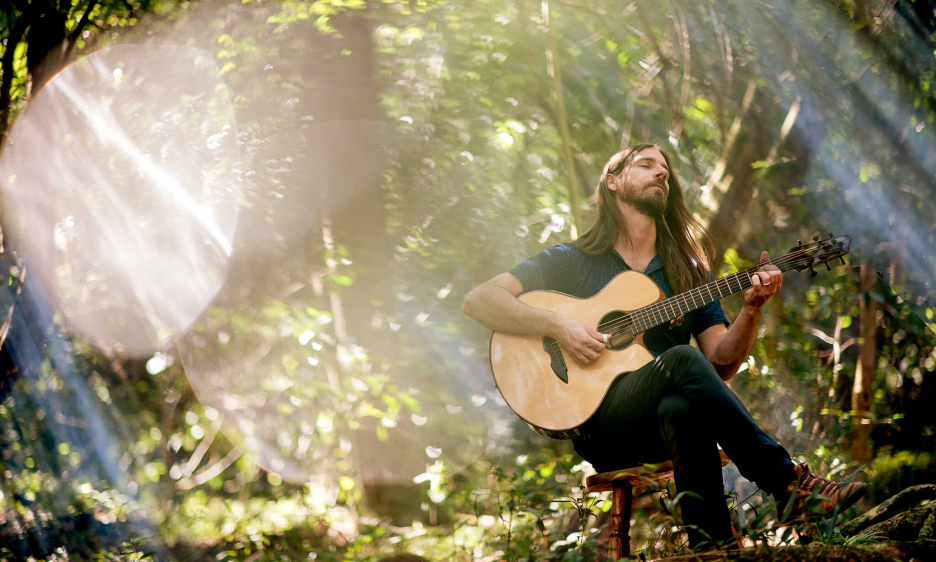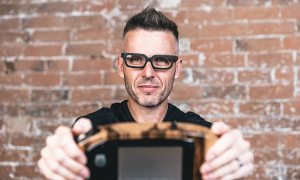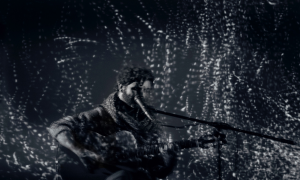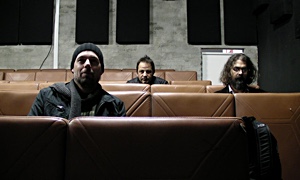Home » Jazz Articles » Forests of Sound » Guy Buttery: A Trio Of Heart
Guy Buttery: A Trio Of Heart

One chord and the truth I say. As a result of no major harmonic movements, Indian Classical Music, in my opinion, is the richest music on the planet when it comes to melody. Their chromatic scale has 22 notes (as opposed to 12 in the West) so just by nature of having that in place, there is already a whole lot more to consider and explore melodically.
—Guy Buttery
India soon beckoned again and, serendipitously, just before South Africa entered lockdown, Buttery arrived in the country, having been invited for a concert tour. It was during this tour that he met, for the first time, master musicians Mohd. Amjad Khan (tabla) and sarangi virtuoso, Mudassir Khan---regarding the sarangi, Buttery gushes: "Mudassir has harnessed the potential of the rare and notoriously difficult instrument, whose sound most resembles that of the human voice, and is an instrument I have become overly obsessed with." Regarding the essentially improvised performance, Buttery says: "It seems impossibly fortuitous that the celestials and traffic gods aligned to allow One Morning in Gurgaon to be. All the music you hear contained within is the result of [single] takes. Time didn't allow for more. Amjad chose what songs we would play. Our rendition of "Raag Yaman" presented here was the first and only time we ever played it together. Mudassir gave me a skeleton idea of the raga in spoken word and what unfolded is what you hear here. Everything else was almost certainly telepathic. I was well aware of the intuition and openness in the room that consequential morning in Gurgaon. I feel incredibly humbled to have shared in sound with these two masters and am forever grateful to them both for their profound musicianship, their warm hearts and their spontaneous spirits."
"We went in totally blind to that first concert, yet what unfolded on stage over the next hour left me in complete awe. So much so that after our performance I immediately set about asking anyone who would listen how we could track down a local studio to capture our newly formed trio. As luck would have it, the very place where we had performed that first night had a basic recording set-up and we somehow managed to secure a single morning to record." The album One Morning in Gurgaon was subsequently released in both the UK and on vinyl in Japan. Garnering rave reviews from across the globe, their record made the Album of the Year list for NPR and charted at #10 on the World Music Charts in Europe.
We spoke to the trio about the album and its inception:
All About Jazz: Dear Mudassir Khan, please tell us why the sarangi is your instrument of choice?
Mudassir Khan: There are three reasons for why the sarangi is my Instrument of choice. Firstly, this instrument is so soulful and melodious that after first hearing its sound, I thought that this was what I would learn. Secondly, I am of the 7th Generation of my Sarangi family. Lastly, this instrument is very difficult to learn and there are few people who play it.
AAJ: Mr. Buttery, when did you first become intrigued by Indian Classical music?
Guy Buttery: Strangely enough, and quite humorously, my first interaction with Indian Classical Music was through the early '90s film My Girl (starring who else but Macaulay Culkin). There was a scene in the movie centred around a tanpura (the Indian drone instrument) and I remember that sound struck me like no other. I was 8 or 9 years old at the time I guess. It was strangely very exotic and simultaneously super familiar at the same time. Indian music continues to feel this way for me.
AAJ: Why do you think you have such a natural and intimate relationship/connection to said music?
GB: I think growing up in Durban (South Africa) had a lot to do with it. I grew up on the North Coast and have vivid and powerful memories of music emanating from all of the surrounding Hindu temples. Within my own process of writing music, I guess I've also focused a bit more on melody rather than real dense and complex harmonies. Indian Classical Music has little to no harmony with one singular tonal centre (meaning there are no chord changes) and I always loved one chord tunes or tonal music. One chord and the truth I say. As a result of no major harmonic movements, Indian Classical Music, in my opinion, is the richest music on the planet when it comes to melody. Their chromatic scale has 22 notes (as opposed to 12 in the West) so just by nature of having that in place, there is already a whole lot more to consider and explore melodically.
I was also really fortunate to visit India in my late teens and came back with a bunch of cassettes and that changed things up real quick. Technicalities aside, for me personally there is no music that I've come across that somehow really grounds and at the same time elevates me. I've lost/found myself at the tail end of many 80-minute ragas wondering where the time went. It's an ongoing meditation. My good friend and collaborator Kanada Narahari helped me take this listening practice a whole lot further. The staggering voice and music of Kishori Amonkar saved my life at one point and that's no exaggeration. If you take anything from this article, seek out Kishori. She's quite likely the greatest vocalist to have ever lived.
AAJ: What brought about your collaboration with Amjad and Mudassir?
GB: I was en route to a monastery in Sri Lanka and had a stopover in Delhi. I offered to help someone take Bollywood records from Durban to sell on in India. I believe it's called muling. True story too. On that stop-over I was also asked to collect some tabla drum skins for a friend in the Cape (also possible muling) and was put in touch with tabla master Mohd. Amjad Khan. We didn't physically meet on that trip but stayed in touch. He said I should hit him up for a jam next time I was in town. Shortly after, I was booked for a seven-city solo tour of India and I asked if Amjad would be keen to join in on some concerts in Delhi. Being rather smitten with the sarangi (the 43 stringed bowed instrument from North India) I then asked if he knew anyone that played the instrument and he immediately suggested Mudassir Khan. Within minutes of hearing him play, I knew this would be an epic ride. We did all our rehearsals over WhatsApp and went straight into our first gig. I was totally blown away by both of them and have literally been doing jumping jacks at the thought that we get to do it all over again here in South Africa.
AAJ: Mr. Mohd. Amjad Khan, tell us about your experience of performing/recording One Morning in Gurgaon?
Mohd. Amjad Khan: It's such a fantastic experience to record our 1st International Album with such awesome musicians, I'm really lucky to be a part of it. While the Guy Buttery India tour happened in 2019, we had couple of shows together and we got huge success with it— people loved our collaboration and the vibes of Indian & Western styles intermingling came off super fantastic, then we decided to capture our moment to present it to the whole world. I remember before the morning (of our recording) during the night I listened to all the songs again and opened up my instrument and sat for a couple of hours to get some arrangements done, because we didn't have any rehearsals. Finally morning came and we got ready to go to our destination, which was in Gurgaon. It was a super lovely, bright and shining morning in Delhi NCR, the likes of which I'd never seen before. Finally we reached the studio and set up everything. When we started the recording I remember (the sound of) the plugging in of Guy's guitar and the snoring of Sarangi. It felt like inside of my mind and blood I could clearly see the way to go smoothly---it was like someone gives you all the answer to your inner questions. The music was really soulful and deep—some of songs are really joyful, very funky and groovy, the rest is traditional Indian Classical music. Because we are all skilled and professional musicians, after five to six hours the album was perfectly done following a couple of retakes and a lunch break. When we heard the outcome of the recording we were mind-blown.
< Previous
Scott Wilson: Nurturing Future Gener...
Next >
Contradictio
Comments
About Guy Buttery
Instrument: Guitar, acoustic
Related Articles | Concerts | Albums | Photos | Similar ToTags
For the Love of Jazz
 All About Jazz has been a pillar of jazz since 1995, championing it as an art form and, more importantly, supporting the musicians who create it. Our enduring commitment has made "AAJ" one of the most culturally important websites of its kind, read by hundreds of thousands of fans, musicians and industry figures every month.
All About Jazz has been a pillar of jazz since 1995, championing it as an art form and, more importantly, supporting the musicians who create it. Our enduring commitment has made "AAJ" one of the most culturally important websites of its kind, read by hundreds of thousands of fans, musicians and industry figures every month.























